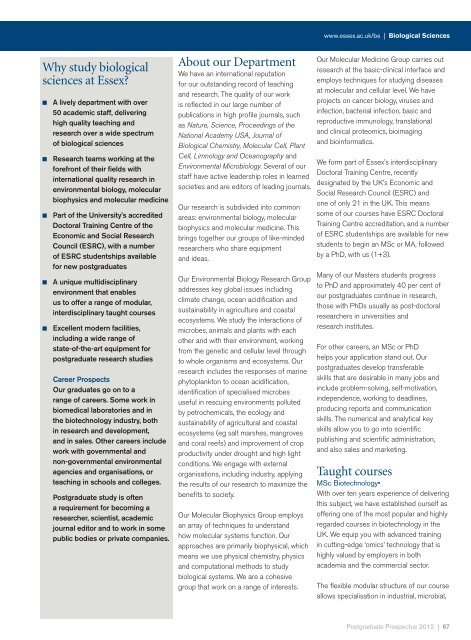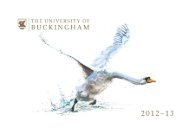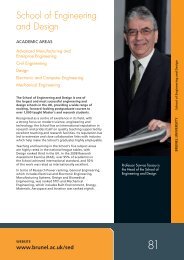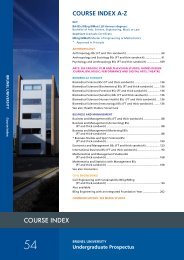Postgraduate Prospectus
Postgraduate Prospectus
Postgraduate Prospectus
Create successful ePaper yourself
Turn your PDF publications into a flip-book with our unique Google optimized e-Paper software.
www.essex.ac.uk/bs | Biological Sciences<br />
Why study biological<br />
sciences at Essex?<br />
n<br />
n<br />
n<br />
n<br />
n<br />
A lively department with over<br />
50 academic staff, delivering<br />
high quality teaching and<br />
research over a wide spectrum<br />
of biological sciences<br />
Research teams working at the<br />
forefront of their fields with<br />
international quality research in<br />
environmental biology, molecular<br />
biophysics and molecular medicine<br />
Part of the University’s accredited<br />
Doctoral Training Centre of the<br />
Economic and Social Research<br />
Council (ESRC), with a number<br />
of ESRC studentships available<br />
for new postgraduates<br />
A unique multidisciplinary<br />
environment that enables<br />
us to offer a range of modular,<br />
interdisciplinary taught courses<br />
Excellent modern facilities,<br />
including a wide range of<br />
state-of-the-art equipment for<br />
postgraduate research studies<br />
Career Prospects<br />
Our graduates go on to a<br />
range of careers. Some work in<br />
biomedical laboratories and in<br />
the biotechnology industry, both<br />
in research and development,<br />
and in sales. Other careers include<br />
work with governmental and<br />
non-governmental environmental<br />
agencies and organisations, or<br />
teaching in schools and colleges.<br />
<strong>Postgraduate</strong> study is often<br />
a requirement for becoming a<br />
researcher, scientist, academic<br />
journal editor and to work in some<br />
public bodies or private companies.<br />
About our Department<br />
We have an international reputation<br />
for our outstanding record of teaching<br />
and research. The quality of our work<br />
is reflected in our large number of<br />
publications in high profile journals, such<br />
as Nature, Science, Proceedings of the<br />
National Academy USA, Journal of<br />
Biological Chemistry, Molecular Cell, Plant<br />
Cell, Limnology and Oceanography and<br />
Environmental Microbiology. Several of our<br />
staff have active leadership roles in learned<br />
societies and are editors of leading journals.<br />
Our research is subdivided into common<br />
areas: environmental biology, molecular<br />
biophysics and molecular medicine. This<br />
brings together our groups of like-minded<br />
researchers who share equipment<br />
and ideas.<br />
Our Environmental Biology Research Group<br />
addresses key global issues including<br />
climate change, ocean acidification and<br />
sustainability in agriculture and coastal<br />
ecosystems. We study the interactions of<br />
microbes, animals and plants with each<br />
other and with their environment, working<br />
from the genetic and cellular level through<br />
to whole organisms and ecosystems. Our<br />
research includes the responses of marine<br />
phytoplankton to ocean acidification,<br />
identification of specialised microbes<br />
useful in rescuing environments polluted<br />
by petrochemicals, the ecology and<br />
sustainability of agricultural and coastal<br />
ecosystems (eg salt marshes, mangroves<br />
and coral reefs) and improvement of crop<br />
productivity under drought and high light<br />
conditions. We engage with external<br />
organisations, including industry, applying<br />
the results of our research to maximize the<br />
benefits to society.<br />
Our Molecular Biophysics Group employs<br />
an array of techniques to understand<br />
how molecular systems function. Our<br />
approaches are primarily biophysical, which<br />
means we use physical chemistry, physics<br />
and computational methods to study<br />
biological systems. We are a cohesive<br />
group that work on a range of interests.<br />
Our Molecular Medicine Group carries out<br />
research at the basic-clinical interface and<br />
employs techniques for studying diseases<br />
at molecular and cellular level. We have<br />
projects on cancer biology, viruses and<br />
infection, bacterial infection, basic and<br />
reproductive immunology, translational<br />
and clinical proteomics, bioimaging<br />
and bioinformatics.<br />
We form part of Essex’s interdisciplinary<br />
Doctoral Training Centre, recently<br />
designated by the UK’s Economic and<br />
Social Research Council (ESRC) and<br />
one of only 21 in the UK. This means<br />
some of our courses have ESRC Doctoral<br />
Training Centre accreditation, and a number<br />
of ESRC studentships are available for new<br />
students to begin an MSc or MA, followed<br />
by a PhD, with us (1+3).<br />
Many of our Masters students progress<br />
to PhD and approximately 40 per cent of<br />
our postgraduates continue in research,<br />
those with PhDs usually as post-doctoral<br />
researchers in universities and<br />
research institutes.<br />
For other careers, an MSc or PhD<br />
helps your application stand out. Our<br />
postgraduates develop transferable<br />
skills that are desirable in many jobs and<br />
include problem-solving, self-motivation,<br />
independence, working to deadlines,<br />
producing reports and communication<br />
skills. The numerical and analytical key<br />
skills allow you to go into scientific<br />
publishing and scientific administration,<br />
and also sales and marketing.<br />
Taught courses<br />
MSc Biotechnology•<br />
With over ten years experience of delivering<br />
this subject, we have established ourself as<br />
offering one of the most popular and highly<br />
regarded courses in biotechnology in the<br />
UK. We equip you with advanced training<br />
in cutting-edge ‘omics’ technology that is<br />
highly valued by employers in both<br />
academia and the commercial sector.<br />
The flexible modular structure of our course<br />
allows specialisation in industrial, microbial,<br />
<strong>Postgraduate</strong> <strong>Prospectus</strong> 2012 | 67

















